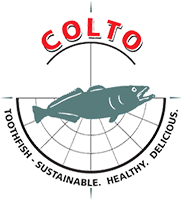 COLTO Member, Georgia Seafoods Ltd, is sponsoring a PhD studentship on the Patagonian toothfish, also known as Chilean seabass. The Patagonian toothfish (Dissostichus eleginoides) is a large predatory demersal fish endemic to the Southern Hemisphere. It supports a valuable commercial MSC certified fishery in South Georgia. Relatively little is known about what makes ideal breeding conditions although there are indications that environmental factors play a key role. An improved understanding of the mechanisms driving recruitment variability is needed to forecast years of good or poor recruitment. The aim of this studentship is to generate knowledge essential to understanding variability in the recruitment of toothfish in South Georgia and use this to develop predictive models. Time series data including sea surface temperature, abundance and physiological condition of spawners are among the datasets available.
COLTO Member, Georgia Seafoods Ltd, is sponsoring a PhD studentship on the Patagonian toothfish, also known as Chilean seabass. The Patagonian toothfish (Dissostichus eleginoides) is a large predatory demersal fish endemic to the Southern Hemisphere. It supports a valuable commercial MSC certified fishery in South Georgia. Relatively little is known about what makes ideal breeding conditions although there are indications that environmental factors play a key role. An improved understanding of the mechanisms driving recruitment variability is needed to forecast years of good or poor recruitment. The aim of this studentship is to generate knowledge essential to understanding variability in the recruitment of toothfish in South Georgia and use this to develop predictive models. Time series data including sea surface temperature, abundance and physiological condition of spawners are among the datasets available.
Director of Georgia Seafood Stuart Wallace explained that in a market that demands sustainability it is important to the company that they support the science underpinning that aim. With this in mind he approached Dr Paul Brickle of the South Atlantic Environmental Research Institute (SAERI) to identify a knowledge gap they could assist in, which in turn has created an exciting opportunity through Aberdeen University for a PhD student to research the reproductive biology and recruitment dynamics of this important commercial fish. The research will benefit science and ultimately give the industry a better understanding into the management and monitoring of the stock by providing insight into the core fishery of the region. said Mr Wallace. A sentiment reinforced by Chief Executive and Director of Fisheries for the Government of South Georgia and South Sandwich Islands, Martin Collins, who agreed the project would, provide valuable data to assist in our management of Patagonian toothfish in South Georgia waters and help ensure the long-term sustainability of the fishery. Dr Tara Marshall, Senior Lecturer at the School of Biological Sciences, University of Aberdeen said The research questions posed by the project are central to understanding why there are large fluctuations in productivity of Toothfish. Consequently the project will deliver biological and ecological knowledge essential for developing effective strategies for sustainable management. Examining the links between the environment and reproduction are of particular interest given that the South Georgia ecosystem is characterised by highly variable oceanographic conditions.
This studentship is collaboration between Georgia Seafoods Ltd., Government of South Georgia and the South Sandwich Islands (GSGSSI), University of Aberdeen, South Atlantic Environmental Research Institute (SAERI), British Antarctic Survey (BAS), and the Centre for Environment, Fisheries & Aquaculture Science (CEFAS). This collaboration represents an excellent model whereby industry and the scientific community join forces for the improved management of a valuable marine resource. commented Dr Brickle.
Delighted British Antarctic Survey Scientist Dr Mark Belchier stated “A greater understanding of the mechanisms which underpin and drive recruitment variability in this highly valuable fish will help to ensure the continuing sustainable management of the species across its geographic range.”
-taken from Fortuna.com
